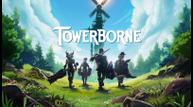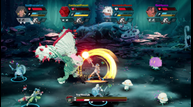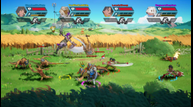
Xbox Games Studios and Stoic announce co-op action RPG Towerborne for Xbox Series X|S, Xbox One, and PC
During the June 2023 Xbox Games Showcase, Xbox Games Studios and Stoic (The Banner Saga) announced Towerborne, a co-operative action RPG set to release for Xbox Series X|S, Xbox One, and PC in 2024.
An announcement trailer, publisher interview, and some screenshots can be found below, via Xbox and Stoic.
Gear up and get ready for a brand-new take on action RPGs in Towerborne, a new adventure unveiled during the Xbox Games Showcase 2023. The title comes from Stoic, the studio behind the award-winning tactical RPG Banner Saga franchise – and I had the chance to speak to studio co-founder and Towerborne Principal Game Designer Alex Thomas and Lead Combat Designer Isaac Torres to lift the lid on this wonderful-looking action RPG.
Towerborne promises quite a different experience from the one delivered in the studio’s previous trilogy. Thomas recalls a review in which Banner Saga was dubbed as a “depression simulator” because of its serious storyline, brimming with more adult themes, and deep difficulty. With that in mind, the team wanted to go in a more family-friendly direction with Towerborne, a lighter hearted adventure with tons of replayability.
“We really wanted to make a game that we could play with our families, play at conventions – make it a sit-down-and-have-fun kind of experience,” Thomas explains. “We all love and are inspired by classic beat ’em up games and wanted to make one with persistence, where we can continue to expand the features and the gameplay modes for as long as possible.”
The heroes of Towerborne are known as Aces, and they’re pivotal to the lore of the world. The team identified early on that it wanted death to be a part of the narrative. So, contrary to most games where the player simply dies and respawns as though nothing happened, Aces remember their demise, and it becomes part of their story – a roguelike element we haven’t seen emulated in many games of this kind.
“As an Ace, you’re a special force for good because you’re able to go out and face the most dangerous stuff, die, and then come back,” Thomas explains. “We didn’t want to just gloss over it like a normal gameplay thing, but instead ask what that would be like for a group of people experiencing it.
“You’re not just doing it because you’re some kind of superhero, you’re doing it because you’re supporting this whole civilization during something of a cataclysm.”
Towerborne is a seasonal game, and the team plans to consistently add new things to do over time. There’s also an overarching storyline, which the studio wants to keep close to its chest for now. What Thomas did tell us is that Stoic aims to create organic updates that really feel like they’re shaping Towerborne‘s narrative.
“The premise that we’ve created revolves around how you can do a seasonal game that doesn’t feel artificial,” Thomas says. “How can you make a story where the content updates and the changes that happen to the gameplay feel like they’re intertwined with the world?”
Traversing The Wilds
Players can customise their Ace completely; everything from their look and style, through to their equipment, weapons, and abilities, which we’ll dig into a little later on. This character management happens at The Belfry, which serves as a hub and a reprieve from the game’s dangerous and ever-evolving world. The Wilds outside The Belfry are brimming with unique encounters and special situations, some of which will trigger new questlines, or even cause the world to respond to your actions.
“We wanted a world where players are actively exploring and opening up new parts, as opposed to one that feels like you’re just opening a UI menu and thumbing through for the next mission,” Thomas says. “That was a key element to us, not wanting to do the standard MMO-like trope of going into town, ten people have something to tell you, and then you take a bunch of quests.
“Towerborne is coming from the opposite direction; you’re going out and discovering things, and the world responds to what you are doing, and acknowledges the player.”
The Wilds are packed with areas to explore, and more importantly – a plethora of ferocious enemies to do battle with. While this is an action RPG at heart, inspired by classic brawlers, the team didn’t want baddies to feel disposable in any way – fights are meaningful, and a challenge that players need to think about.
“As a team, we designed enemies in a way that really makes them feel like unique characters in their own right,” Torres tells us. “So it’s not like, ‘Here’s this enemy, he’s just there, you just beat them up.’ A lot of the moves that they do we designed in a way so that that feels cool and spectacular.”
“So if you see an enemy doing all these cool spin attacks for example, or they’re doing weird flips, as a player, we want you to want that ability. And maybe at some point in time, you will find something that gives you those kinds of abilities.”
Mix N’ Match Combat
As an action-RPG, combat is where Towerborne really aims to shine. Players are offered a rich arsenal of weaponry and abilities to wield, all belonging to four styles: War Clubs, Gauntlets, Dual Daggers, and Swords & Shields. Torres tells us that there are different variations of each, which all have unique moves that can mix and match depending on how you like to play.
“Each weapon is just one way to make you feel badass,” Torres says. “Sword and Shield, for example, there’s one version where you can strike repeatedly with flashy attacks, and then there’s another type that’s more defensive, so you can take on more of a protector role. So even within a certain archetype, like Sword & Shield, you can assume different types of playstyles.”
“The Gauntlet is your up close and personal weapon set, and it has a bit of a pro wrestling flair to it as well, which is really fun,” Torres adds. “It’s also a homage to your classic beat ‘em ups that we’ve all played, and it fulfils that player fantasy of just wanting to punch something in the face.”
Build customisation can be taken one step further with the use of Umbra, which can amplify your skillset even more. This can come in the form of a big, bombastic damage attack, or something more conservative like a ward of protection that your whole team can utilise.
The differentiation should make for a brilliant online co-op experience, particularly when you’re matchmaking with random players. If everyone chooses the same weapon type, it’s very unlikely that someone on your team will have exactly the same build as you.
“It allows organic cooperative play which is really key to this kind of game, and it allows you to explore different setups and different Umbra abilities,” Torres says. “We don’t want to force online players into a specific archetype or feel like they can’t join in a game with anybody. You should feel comfortable enough to play any weapon, any style, and know that you’re going to contribute to the party as a whole.”
That also means that one specific person on the team won’t be responsible for one role, and, if you’ve been reluctantly shoehorned into healing in just about every online game, you’ll know exactly what I mean.
“Healing is a great example of something that we’re extremely careful with because it’s not a game where we expect one player to be managing other people’s survival,” Thomas adds. “That’s an example of how we’re designing it around everyone being effective and cooperative, but not demanding certain expectations from players on the team.”
Easy to Start, Fun to Master
Towerborne is set to accommodate endless styles of play, but a vast variation in skill. It aims to be approachable at a base level, but provide a steady uptick in difficulty so that players have constant challenges to get stuck into.
“The skill floor is really low, but the skill ceiling is really high,” Torres explains. “The controls are relatively simple to understand. Every single player should be able to just push buttons and have the game feel satisfying. Every attack has this really crunchy feel to it, they look really cool, and there’s not a huge ask from the player in terms of input.”
But the really cool thing about the combat system is because of the expandability of all the different weapon archetypes, Umbra abilities, and all the customization that you can do, it makes it really feel like you can find your perfect fighting style.
“You just tap a button and you get to see something awesome on screen. It really fulfils that old-school arcade feeling of doing that one-button press,” Torres says. “For a game like this, that’s really important because we want to keep the players playing, we want it to feel like there’s something to grow toward.”





